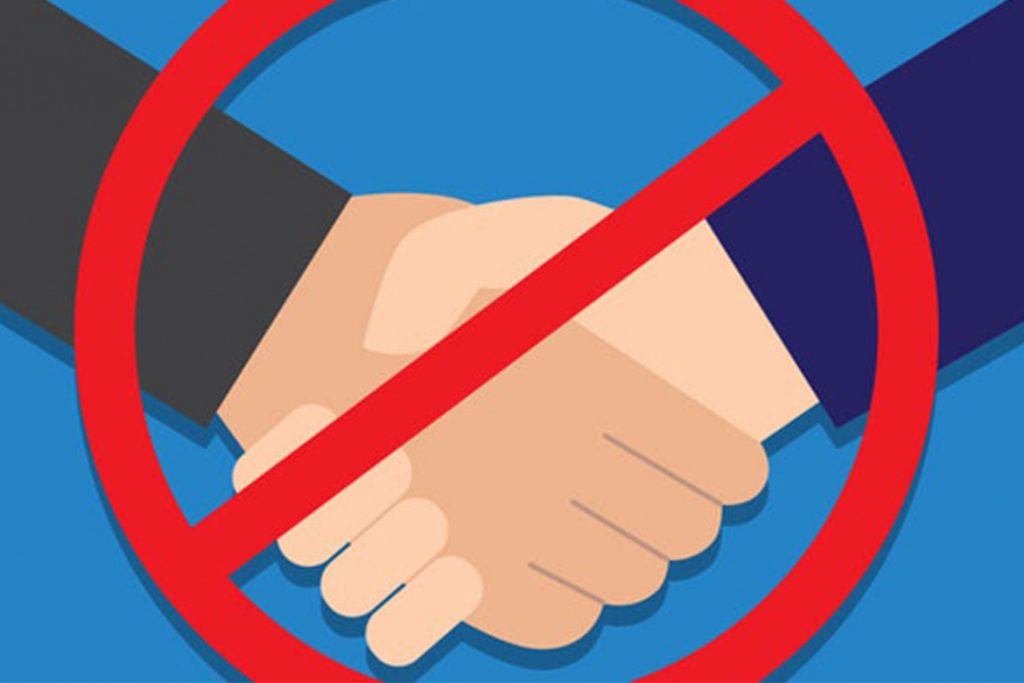An article was published in BBC which talks about whether we will be shaking hands ever again? Ever since the world is following social distancing norms, people are restraining themselves from a very old social convention, i.e., ‘Handshaking’. James Jeffery writes in his article that Shaking hands might be one of the hardest customs to lose in the post-pandemic world but there are alternatives.
Handshaking was the most common greeting gesture among people across the world before this Pandemic situation. Handshake was serving all sort of social meeting purposes like meeting a stranger, signing of big business deal or signing an agreement between world leaders. But after the Coronavirus hit world is refraining this gesture to avoid spread of virus.
History of handshake could be traced back in ancient Greece, where it was used as a sign of peace between two people by showing each other that none of them is carrying a weapon. Or it could be traced in Medieval Europe, where knights used it as a precautionary move to loose any hidden weapon by shaking motion. But the Quakers are the one who made it popular, it was because of their belief as they find this more egalitarian than bowing.
Also Read: Covid-19 Vaccine could take two years: Bill Gates
Cristine Legare, a psychology professor tells that this is literal gesture of human connectedness which shows how humans evolved into deep social beings. This actually emerged from internal social drive of ‘to touch and being touched’ which is also present in other animals. This could be substantiated by the observation of American psychologist Harry Harlow who found that touch is very vital for the development of young rhesus monkeys. This is also common in Chimps, who hug, touch palms and kiss each other to show affection.
But the same time there are also several social gestures around the world which avoid the contact with other person like the tradition ‘Hindu Namaste’ or like Muslim nations, people put a hand over their hearts which is a respectful way to greet someone you are not accustomed to touching.
After 1920, many studies appeared in the American Journal of Nursing which warned people of handshaking as hands are the agents of pathogen transfer, and recommended that people should adapt the Chinese custom at the time, of shaking one’s own hands together when greeting a friend. Later also many studies came which objected hand shaking or other physical contact. But even after all the objections the gesture of handshake evolved more in 21st century and become a unassailable symbol of professional greeting. Some scientific studies suggest that a good handshake activates the same part of the brain that processes other types of reward stimulus.

As eventually now many countries are easing lockdown measures, then what would be the future of handshake? Will it be like pre Coronavirus world? Dr. Anthony Fauci said “I don’t think we should ever shake hands ever again, to be honest with you. Not only would it be good to prevent coronavirus disease; it probably would decrease instances of influenza dramatically in this country”. According to Elke Weber, a professor of psychology habits usually do not change easily, but at the time of special circumstances habits and social customs can and do change. There are several other non contact gestures which people can adopt like Namaste, bowing also there is waving, nodding, smiling and myriad hand signals.
Professor Arthur Markman says “While avoiding disease is an essential part of human survival, so is living fulfilling and complex social lives,” “Perhaps we start by focusing on more routine hand washing, hand sanitizers, and strategies to avoid touching your face rather than giving up touch altogether”.
